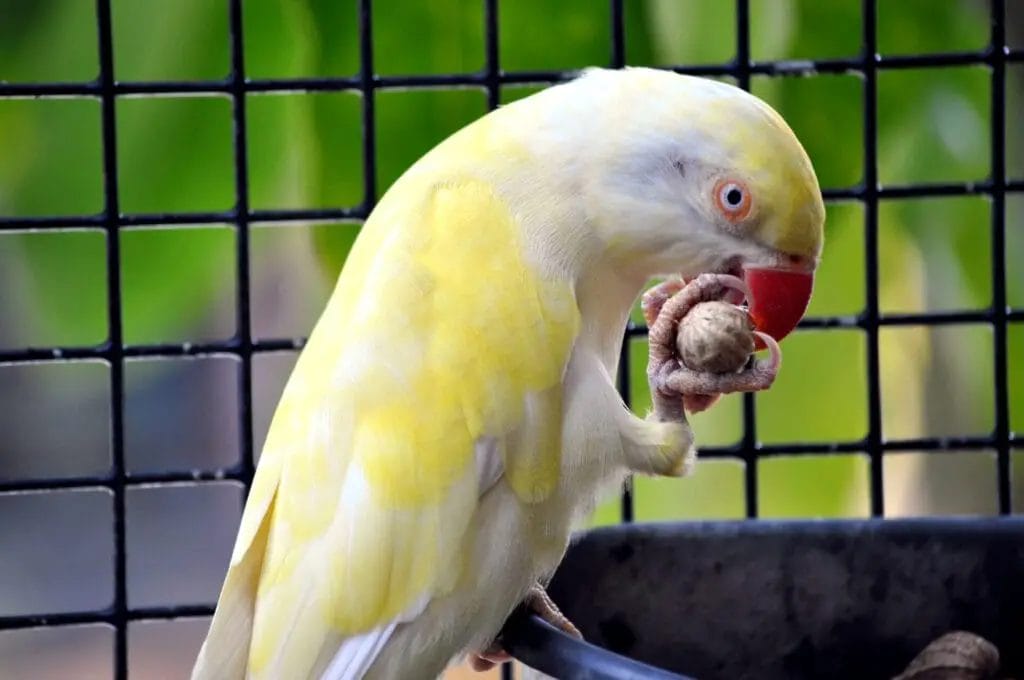
Indian Ringnecks are vibrant, intelligent, and social birds that make wonderful pets for those who are prepared to meet their needs. As a first-time bird owner, understanding the essentials of Indian Ringneck care is crucial to ensuring a happy and healthy life for your feathered friend. This guide will provide you with a comprehensive overview of caring for Indian Ringnecks, from feeding and grooming to socializing and training.
Key Takeaways:
- Indian Ringnecks require a balanced diet and regular health check-ups.
- Socialization and training are essential for a well-adjusted pet.
- Proper habitat setup and enrichment are crucial for their well-being.
- Understanding common behaviors can help in building a strong bond.
- Regular grooming and health monitoring are necessary for their longevity.
Introduction to Indian Ringneck Care
Indian Ringnecks are known for their striking appearance and playful nature. As a beginner’s guide to Indian Ringnecks, this article will cover everything from feeding guides to socializing tips, ensuring you have all the information needed to care for your new pet. Whether you’re interested in training Indian Ringnecks or learning about their common behaviors, this guide is tailored for first-time bird owners looking to bond with their Indian Ringneck.
Setting Up the Perfect Habitat
Choosing the Right Cage
The first step in caring for Indian Ringnecks is setting up a suitable habitat. A spacious cage is essential, allowing your bird to stretch its wings and move around comfortably. Ensure the cage is placed at eye level to make your bird feel secure and part of the family.
Enriching the Environment
Indian Ringnecks thrive in an enriched environment. Provide a variety of toys to stimulate their minds and prevent boredom. Rotate toys regularly to keep their interest piqued.
Feeding Your Indian Ringneck
Balanced Diet
A balanced diet is crucial for the health of your Indian Ringneck. Include a mix of seeds, pellets, fruits, and vegetables to ensure they receive all necessary nutrients.
Feeding Schedule
Establish a regular feeding schedule to maintain their health. Monitor their eating habits and adjust portions as needed to prevent obesity.
Socializing and Training
Building Trust
Socializing Indian Ringnecks is key to developing a strong bond. Spend time talking to your bird and offering treats to build trust.
Training Techniques
Training Indian Ringnecks can be a rewarding experience. Start with simple commands and gradually introduce more complex tricks. Consistency and patience are vital.
Health and Grooming
Regular Health Check-Ups
Regular visits to an avian vet are essential to ensure your Indian Ringneck remains healthy. Look out for signs of illness such as changes in appetite or behavior.
Grooming Tips
Grooming is an important aspect of Indian Ringneck care. Regularly check their feathers, beak, and nails, and ensure their wings are clipped if necessary.
Understanding Common Behaviors
Recognizing Stress Signals
Understanding common Indian Ringneck behaviors can help you identify stress or discomfort. Look for signs such as feather plucking or excessive vocalization.
Encouraging Positive Behavior
Encourage positive behavior by rewarding your bird with treats and praise. This will reinforce good habits and strengthen your bond.
Conclusion
Caring for Indian Ringnecks requires dedication and knowledge, but the rewards are immense. By following these tips, you can ensure a fulfilling relationship with your feathered companion. Remember, every Indian Ringneck is unique, so take the time to understand your bird’s individual needs and preferences.
FAQ
- What should I feed my Indian Ringneck?
- A balanced diet of seeds, pellets, fruits, and vegetables is recommended.
- How often should I take my Indian Ringneck to the vet?
- Regular check-ups every 6-12 months are advisable.
- How can I tell if my Indian Ringneck is stressed?
- Look for signs like feather plucking, changes in vocalization, or loss of appetite.
- What are the best toys for Indian Ringnecks?
- Toys that stimulate their minds, such as puzzles and foraging toys, are ideal.
- How do I train my Indian Ringneck?
- Start with simple commands and use positive reinforcement techniques.
- How can I bond with my Indian Ringneck?
- Spend quality time with your bird, talk to them, and offer treats to build trust.
- What is the lifespan of an Indian Ringneck?
- With proper care, Indian Ringnecks can live up to 20-30 years.
- Should I clip my Indian Ringneck’s wings?
- Wing clipping is a personal choice but can prevent accidents if your bird is not fully trained.
- How do I socialize my Indian Ringneck?
- Gradually introduce them to new people and environments to build confidence.
- What should I do if my Indian Ringneck is not eating?
- Consult a vet if your bird refuses food for more than a day, as it could indicate illness.
By following these guidelines, you’ll be well on your way to becoming a successful Indian Ringneck owner. Share your experiences or ask questions in the comments below!
